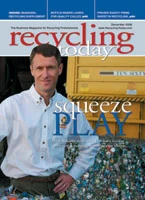ENVIRONMENTALLY UNFRIENDLY
During the Bureau of International Recycling (BIR) autumn convention, which was held in Brussels in late October, attendees of the Plastics Round-Table discussed problems associated with the regulatory environment in Europe.
Surendra Borad, chairman of BIR’s plastics division, said that the imposition of multiple rules and regulations on recyclable plastics made it difficult to operate in Europe. He told the delegates in attendance: "I strongly feel that we in the plastics industry are being over-regulated in Europe. The feeling is more intense when we find that our fellow North American and Australian businessmen are not subject to so many strict rules."
A report submitted by Michael Lion of the Sims Group provided delegates with a brief overview of market conditions in Australia, where annual consumption of plastics is around 1.6 million metric tons and is growing roughly 2 percent per year. Australia’s recycling rate currently stands at 15 percent, but a target of from 30 percent to 35 percent has been set for 2008. Most of the 210,000 metric tons recycled each year in Australia is currently exported to China.
As for the Chinese market itself, Borad reported that the government was becoming stricter in checking imports of low-grade plastics. The higher costs of recycling had put substantial pressure on margins, he said.
Turning to the Indian market, Borad said that 30 factories had finally been successful in obtaining five-year renewals of their exclusive licenses to import scrap plastics. India’s imports of recyclable plastics amount to roughly 100,000 metric tons per year, making the country "a very small player" when compared to China’s annual import total of nearly 3 million metric tons, he said.
Borad also reported on the findings of a three-man delegation facilitated by Gemini Corp. to examine environmental and child labor practices within India’s plastics recycling sector. He said, "There is absolutely no scope for dumping or illegal incineration. Plastics reprocessing is fully regulated and, hence, there is absolutely no child labor."
Peter Daalder of Daly Plastics BV in the Netherlands and Jacques Musa of Soulier in France summarized trading conditions in some of the key European markets. Daalder pointed to a slight fall in price levels in the Dutch and German markets, though he said most reprocessors were reportedly optimistic in light of to the strength of regranulate sales. Meanwhile, shipments to Asia had dropped 25 percent since the spring of this year. According to Musa, there had been an upturn in the availability of secondary PET on the French market in light of increased collection levels and the withdrawal of some Chinese buyers.
The report from Spain suggested that quality controls imposed by the Chinese inspection and port authorities were proving increasingly difficult to meet. And in Italy, customs authorities were being "very punctilious" about the description of goods, treating plastic film as "non-exportable waste" because it had not been subjected to transformation. Lieven Lagast of Matco Glas NV in Belgium warned of likely price falls in the local LDPE market in light of demand weakness.
A guest presentation from Honore Paelinck, managing director of Belgium-based Port and Transport Consulting, focused on the growth in containerized shipments in response to ever-increasing demand. He said, "More containers need a larger capacity of shipping, and larger ships result in a lower unit cost price—so ships grow bigger." Having noted that the largest such vessel afloat boasted a capacity of 14,300 TEU (20-foot-equivalent units), he warned: "Larger ships will not offer the same frequency of departures in the limited number of ports they can call because of their size."
Sponsored Content
Labor that Works
With 25 years of experience, Leadpoint delivers cost-effective workforce solutions tailored to your needs. We handle the recruiting, hiring, training, and onboarding to deliver stable, productive, and safety-focused teams. Our commitment to safety and quality ensures peace of mind with a reliable workforce that helps you achieve your goals.
On a brighter note, he predicted that freight rates might fall in the longer term—perhaps two years from now—as a consequence of growth in shipping capacity.
(Additional news about plastics recycling markets is available online at www.RecyclingToday.com.)
Get curated news on YOUR industry.
Enter your email to receive our newsletters.

Explore the December 2006 Issue
Check out more from this issue and find your next story to read.
Latest from Recycling Today
- RRS adds to ownership team
- S3 Recycling Solutions acquires Electronics Recycling Solutions
- Nextek, Coveris to recycle food-grade plastic film
- Recyclekaro expands recycling capacity
- USTR hears comments on port fee proposal
- C&D World 2025 hits record attendance and exhibitor numbers
- Denali now offers mobile depackaging service
- Hyundai confirms Louisiana as EAF mill site






